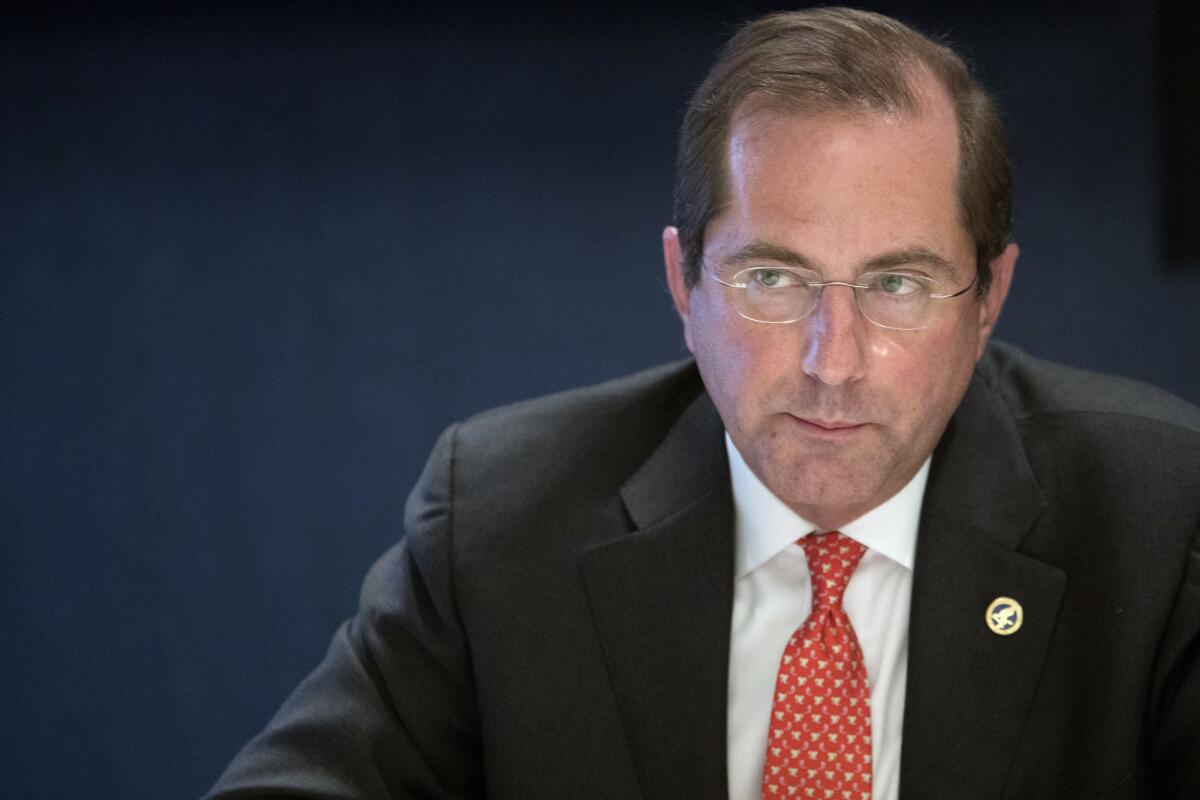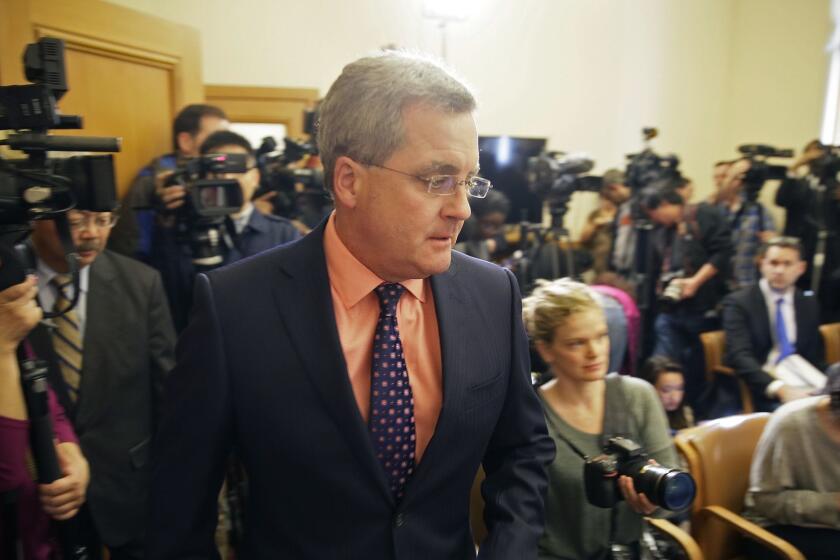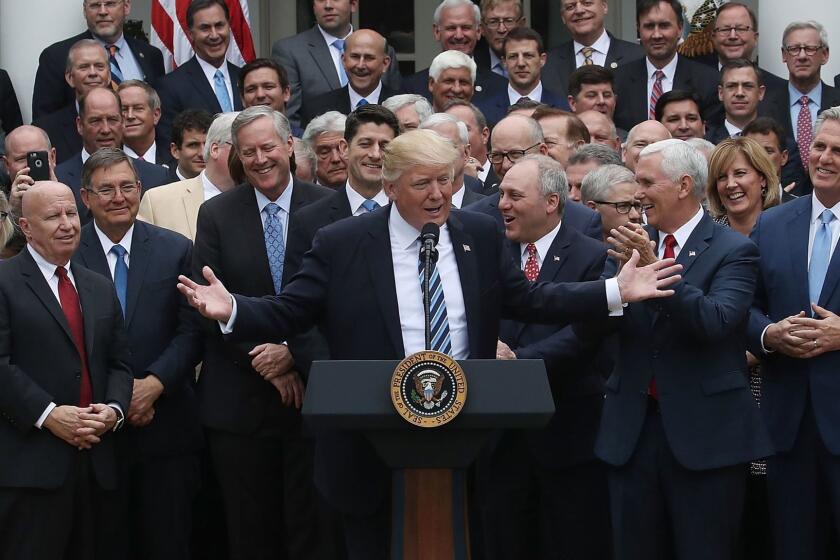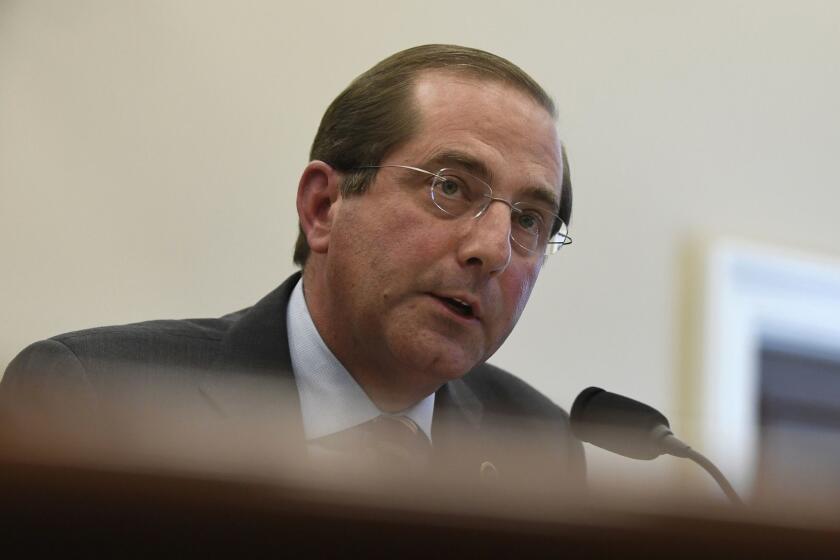Trump’s rationale for antiabortion rule was ‘blatantly’ false, judge rules

- Share via
If there’s a silver lining in the incompetence repeatedly displayed at the highest echelons of the Trump administration, it’s that this quality has kept some of Trump’s most noxious policies from taking effect.
Latest case in point: Trump’s proposed “conscience” rule that would allow medical professionals — and even some nonprofessionals — to refuse to provide medical care on the basis of religious or moral scruples. This week a New York federal judge blocked the rule after finding that the Department of Health and Human Services had justified it with lies.
The agency’s rationale, ruled Judge Paul A. Engelmayer, was “factually untrue.” At different points in his caustic 147-page decision, he also called it “flatly untrue,” “demonstrably false” and “blatantly wrong.” (Hat tip to Harris Meyer of Modern Healthcare for homing in on the decision.)
HHS’s justification for the rule...is wholly unsupported by the record.
— U.S. Judge Paul A. Engelmayer
The decision — based on extensive briefs by the government, 23 states and municipalities that sued to block the rule, and a daylong oral argument last month — opens a window into the administration’s rulemaking process.
Put simply, the record demonstrates almost no effort to craft a justification that would stand up to scrutiny for a rule with transformative impacts on healthcare. Engelmayer called it “a classic solution in search of a problem” and “quintessentially arbitrary and capricious.”
The latter phrase is commonly used by judges to find that a rule change has violated federal requirements for backup justification and public comment.
It’s become common in lawsuits over Trump policymaking, in which judges have overturned the president’s efforts to rescind the Obama-era Deferred Action for Childhood Arrivals (DACA) program, which allows those brought illegally to the U.S. as children to remain; rescind Obama regulations on air and water pollution and coal mining; and introduce work requirements for Medicaid recipients in Kentucky and Arkansas.
What does it take to force the Trump administration to back off from a manifestly irresponsible and ill-considered policy?
Trump’s conscience rule had serious implications for healthcare in the U.S., where the right of patients to receive legally and constitutionally protected medical services without the interference of religious zealots has been narrowing alarmingly.
One reason is the expansion of Catholic hospitals, which are subject to the Ethical and Religious Directives on healthcare promulgated by the U.S. Conference of Catholic Bishops. The directives forbid professionals in Catholic medical institutions from participating in elective abortions, sterilizations, services to transgender patients or end-of-life services, and give local bishops the ultimate authority.
HHS issued the rule on May 2 and set it to go into effect on July 22. Facing an onslaught of legal challenges, however, the agency postponed the effective date til Nov. 22. The challenges included the lawsuit by the 23 states and municipalities, another suit by Planned Parenthood that was consolidated with the states’ case in Engelmayer’s court, and a separate suit brought in San Francisco federal court by California, San Francisco and Santa Clara County.
The rule “emboldens individual employees to dictate whether and how patients receive healthcare based on their own personal religious views,” stated Santa Clara in a motion filed June 11.
Engelmayer directed his misgivings mostly at the claim by HHS that expansion of the conscience rule was justified by a “significant increase” in complaints by healthcare workers of having been forced to participate in procedures, such as abortions, despite their religious or moral objections. HHS had asserted in court that there had been only 34 such complaints between November 2016 and January 2018, but 343 during fiscal 2018.
Buried within a recent judicial ruling overturning the Trump administration’s approval of the largely pointless Cadiz water project are a few clues to why Trump’s policymaking is so often blocked in federal court.
Once the judge finished parsing this claim to determine how many complaints actually were germane to the rule change, the real number turned out to be not 343, but seven.
The record, he concluded, “reflects either no increase at all, or that any increase was so small as to be asymptotic to [that is, indistinguishable from] zero.” He added, “HHS’s justification for the rule ... is wholly unsupported by the record.”
The government’s game of fun with statistics wasn’t Engelmayer’s only issue with the conscience rule. But first, here’s some background.
The rule would have vastly expanded the scope of existing federal regulations granting cover to doctors, nurses and other healthcare workers with religious or moral objections to participation in certain procedures such as abortions, sterilizations and assisted suicide.
Some of the existing rules date back as far as 1973, but they typically have carve-outs for cases such as medical emergencies or staffing limitations in which the scruples have to be set aside so a patient can be safely and promptly treated.
On the very same day that they celebrated House passage of a bill that could deprive more than 24 million Americans of their health coverage, President Trump and his administration started gunning for women’s contraceptive benefits.
As we’ve reported before, conscience exemptions that allow medical providers to refuse to provide certain services have been a political football for years. The George W. Bush administration tried widening the protections with a rule cynically scheduled to go into effect on the day of Barack Obama’s inauguration.
Obama threw it out, in part on the grounds that the Bush administration acknowledged that of the 97,000 public comments its HHS had received on its proposal, an “overwhelming number” expressed concern that the rule change would reduce access to care, especially access to reproductive services and contraception for women.
The Trump administration revived and expanded the Bush proposal. Its rule would cover workers with even the most tangential role in a medical procedure, such as receptionists who schedule appointments or “an elevator operator or ambulance driver responsible for taking a patient to an appointment or procedure,” Engelmayer wrote.
The new rule scrapped the hardship defense for healthcare institutions that can’t accommodate an employee’s objection because it doesn’t have the staff or funding to accommodate the worker’s transfer. The rule also ignored federal laws such as the Emergency Medical Treatment and Labor Act (EMTALA), which requires emergency rooms to treat and stabilize all patients who show up and doesn’t allow for conscience exceptions.
The rule also contained the threat of draconian consequences for employers judged to be in violation — the loss of all federal funding.
The contest for worst Cabinet member of the Trump administration is what we might call “competitive.”
Engelmayer asserted that such a rule change, which would “upend the legal status quo” so thoroughly, required a far more painstaking and discerning justification than the one offered. He rejected the government’s request that he overturn only the parts of the rule he found most dubious and leave the rest standing.
“The rulemaking exercise here was sufficiently shot through with glaring legal defects,” he wrote, “as to not justify a search for survivors.”
A good example is the government’s claim of a “significant increase” in complaints by healthcare workers that they faced employer discrimination for asserting conscientious objections.
HHS had cited in its rule “significant evidence of an environment of discrimination and coercion” directed at religious objectors. But the claim fell apart in Engelmayer’s courtroom.
Of the 343 complaints in fiscal 2018 originally cited by the government, Engelmayer observed, nearly 89% were related to vaccinations, which HHS acknowledged aren’t covered by the conscience rule, in part because vaccination rules generally are left to the states. An additional 49 cases involved other entities or conduct not covered by the rule.
That left about 20 complaints, which the judge called “a far cry” from a “significant increase.” In legal briefs, the government pared that figure down to 11, of which only seven would have been directly covered by the rule. Of the government’s original claim, Engelmayer found, only “shards” remained.
More to Read
Inside the business of entertainment
The Wide Shot brings you news, analysis and insights on everything from streaming wars to production — and what it all means for the future.
You may occasionally receive promotional content from the Los Angeles Times.















